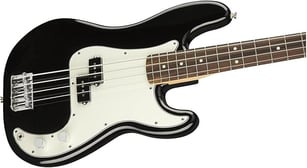Essential Tips for Starting Bass Guitar: Your Guide to Mastering the Basics
Starting bass guitar? Discover essential tips and techniques that will help you build a strong foundation. From understanding the instrument to practicing the right way, this guide covers everything you need to know to kickstart your bass journey with confidence.
BASS GUITARMUSIC GUIDES FOR BEGINNERS
Jeffery Lewis Jr.
8/18/20246 min read


Essential Tips for Starting Bass Guitar: Your Guide to Mastering the Basics
Learning the bass guitar is an exhilarating journey that can open up a whole new world of rhythm, groove, and musical creativity. Whether you're picking up the bass for the first time or looking to refine your skills, this guide is packed with essential tips to accelerate your learning and help you become a confident bassist.
1. Understand the Role of the Bass
The bass guitar is often referred to as the heartbeat of a band. It’s the instrument that ties the rhythm section together, anchoring the music by providing a rhythmic and harmonic foundation. Unlike the lead guitar, which often grabs the spotlight, the bass operates subtly, yet its influence is profound. It drives the groove, creates the pulse of the song, and gives the music its depth and richness.
In-Depth Insight: As a bassist, your primary job is to lock in with the drummer, ensuring that the rhythm remains tight and consistent. This connection between the bass and drums is what gives a song its solid backbone. To truly appreciate the role of the bass, start by immersing yourself in classic basslines from iconic bands like The Beatles, Led Zeppelin, and Motown legends like James Jamerson. Listening to these tracks will give you a clear understanding of how the bass shapes the overall feel and direction of a song.
Pro Tip: Pay attention to how the bass interacts with the drums. Notice the subtle shifts and grooves that happen when the bass follows the kick drum or when it syncs with the snare. This is where the magic of bass playing lies.
Backlink: Learn more about the role of the bass guitar in a band.
2. Focus on Technique
Good technique is the cornerstone of effective bass playing. For beginners, developing proper hand positioning, finger strength, and picking accuracy is crucial. Technique isn’t just about playing the right notes; it’s about playing them in the right way, with the right feel, and at the right time.
In-Depth Insight: Start with simple exercises like scales and arpeggios. These exercises will help you build muscle memory and improve your coordination. Proper hand positioning is key – your fretting hand should be relaxed, with your thumb positioned on the back of the neck for support, allowing your fingers to move freely across the fretboard.
Pro Tip: Practice with a metronome to develop a solid sense of timing and rhythm. This will not only improve your timing but also your ability to play consistently, which is essential for a bassist. Even practicing for 15-20 minutes daily can lead to significant improvement over time.
Backlink: Explore bass technique exercises for beginners.
3. Learn to Read Music and Tablature
While many bass players rely on tablature (tabs) to learn songs, understanding standard musical notation can deepen your musical understanding and improve your overall musicianship. Reading music opens the door to a broader range of music and allows you to communicate more effectively with other musicians.
In-Depth Insight: Learning to read music might seem daunting at first, but it’s a skill that will pay off in the long run. Start with basic sheet music for simple songs and gradually work your way up to more complex pieces. Being able to read both notation and tabs will make you a more versatile player, allowing you to tackle a wider range of music.
Pro Tip: Use online resources like StudyBass that offer free lessons on reading music and understanding bass tabs. This dual approach will enhance your ability to learn new songs quickly and accurately.
4. Play Along with Your Favorite Songs
Playing along with your favorite songs is not only fun but also a highly effective way to improve your bass skills. It helps you develop your ear, learn new techniques, and understand song structure in a practical, hands-on way.
In-Depth Insight: Start with simpler songs that have clear, prominent basslines. This will make it easier to follow along and mimic what you hear. As you become more comfortable, challenge yourself with more complex tracks. This method of learning by doing is one of the best ways to internalize different playing styles and techniques.
Pro Tip: Use slow-down software like Transcribe! or Amazing Slow Downer to break down difficult sections of a song and learn them at your own pace. This allows you to focus on the nuances of the bassline without feeling overwhelmed.
5. Invest in Quality Gear
The gear you use can greatly influence your playing experience. As you progress, investing in quality bass gear can enhance your sound and make practice more enjoyable. A good beginner bass, a reliable amp, and essential accessories like a tuner, strap, and cables are must-haves.
In-Depth Insight: When choosing a bass guitar, consider factors like tone, weight, and playability. For beginners, it’s important to find a bass that feels comfortable and easy to play. Brands like Fender, Squier, and Ibanez offer excellent beginner bass guitars that balance quality and affordability.
Product Recommendations:
A classic choice for bassists, known for its rich tone and versatility.
Ideal for beginners, offering great sound quality in a portable package.
A reliable and accurate tuner that’s perfect for live and studio settings.
6. Join a Community
Being part of a community can provide invaluable support, inspiration, and feedback. Whether online or in-person, connecting with other bass players allows you to share your progress, ask questions, and learn from more experienced musicians.
In-Depth Insight: Engaging with other bassists can expose you to new techniques, genres, and perspectives that you might not encounter on your own. It’s also a great way to stay motivated and accountable in your practice routine.
Pro Tip: Participate in online challenges, join a band, or collaborate with other musicians. Playing with others is one of the fastest ways to improve your skills and gain confidence as a bassist.
Backlink: Join the TalkBass community.
7. Keep a Practice Routine
Consistency is the key to improvement. Developing a practice routine that includes warm-ups, scales, technique exercises, and song practice will help you make steady progress. Set specific goals for each session, such as learning a new song or mastering a particular technique.
In-Depth Insight: A structured practice routine helps you focus on different aspects of bass playing, ensuring that you develop a well-rounded skill set. It’s also important to keep your practice sessions varied to avoid burnout and keep things interesting.
Pro Tip: Use apps like Yousician or Ultimate Guitar’s Tonebridge to guide your practice sessions and track your progress. These tools offer interactive lessons and backing tracks that can make practice more engaging.
Backlink: Discover the benefits of a structured practice routine.
8. Explore Different Genres
Exploring different genres will expose you to a variety of playing techniques and help you become a more versatile bassist. Each genre, whether it’s funk, jazz, rock, or reggae, has its own unique challenges and rewards.
In-Depth Insight: Don’t limit yourself to just one style of music. Experimenting with different genres will broaden your musical horizons and introduce you to new playing techniques. For example, slap bass is a technique commonly used in funk, while fingerstyle is prevalent in jazz. By learning these different styles, you’ll become a more adaptable and skilled bassist.
Pro Tip: Try playing along with songs from different genres. This will not only improve your versatility but also make you a more in-demand musician.
Backlink: Learn more about different bass guitar playing styles.
Conclusion
Becoming a proficient bass guitarist takes time, dedication, and a willingness to learn. By focusing on technique, investing in quality gear, and immersing yourself in different musical styles, you’ll be well on your way to mastering the bass guitar. Remember, every bassist’s journey is unique, so enjoy the process and keep pushing yourself to improve.
Final Tip: Stay curious, stay disciplined, and most importantly, have fun with your bass playing journey! Whether you're practicing alone or playing in a band, the joy of creating music is what makes the journey worthwhile.
© 2024. All rights reserved.








